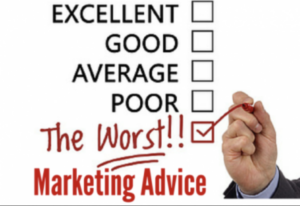General Business Strategy
Marketing tricksters and charlatans. Avoiding the sharks.
Who can you trust these days, that is the question, isn’t it..?
According to a recent poll carried out by Readers Digest, the most trusted professions are doctors, nurses, paramedics and firefighters. Not surprisingly, perhaps, marketers didn’t make the list.
Now as a marketer myself that hurts, especially because I pride myself on my ethics – but we only have ourselves to blame I’m afraid.
All too often, instead of building on long proven principles and using that knowledge to step cautiously forward, we seem determined to dismiss everything that has gone before, and confidently stride towards shiny new things claiming we’ve discovered the holy grail.
And there’s the thing: anybody that tells you you’ll get instant success is not to be trusted! Marketing is responsible for building amazing businesses and brilliant marketing more so, but the greatest examples, the ones that delivered enormous growth and revenues, rarely use some whizzbang new technique – they are highly strategic, highly creative, well-planned, well executed and sufficiently well funded to be effective.
And that should fill you with hope because if you put the right skillsets in place, you too can access all those attributes!
Sure, if you have a big enough marketing budget and can afford to test unproven ideas then fair enough, take a look at what they’re saying. Just remember you only get to spend your budget once!
For most of us working with constrained budgets and trying to grow an SME, we’re much better off sticking to – and perfecting – what works in the kind of world we live in.
So, here’s a few pointers for you, so you can dodge the cons, and watch out for the pitfalls.
In the land of the blind, the one-eyed man is king.
We all know this to be true, and yet, we often allow ourselves to be drawn in, or convinced by confident, charismatic people who seem to have all the answers. People we trust, who we probably shouldn’t.
Of course, it’s not only marketing where this goes on, but somehow, I find it more egregious when the people being ‘conned’ are small business owners, trying to make a go of it and do their best. Running a business is hard enough, without being misled by the very people supposed to be helping you.
In fact, I saw this on TV just the other night, when a marketing ‘expert’ was supposed to be helping an older couple make their Airbnb more profitable, to help them climb out of debt.
He started off saying that SEO (Search Engine Optimisation) would be a great way to get ‘more eyeballs’ on their property and spun a wonderful story of how it would turn their business around, before describing SEM (Search Engine Marketing) to them instead – a totally different set of techniques!
 I know it’s only a small example, but it demonstrated, right there in my living room, exactly the kind of nonsense that goes on all the time. So how do you know if you’re being conned, if you don’t know as much about the subject as the supposed ‘expert’ you’re talking to…? Here’s what to watch out for…
I know it’s only a small example, but it demonstrated, right there in my living room, exactly the kind of nonsense that goes on all the time. So how do you know if you’re being conned, if you don’t know as much about the subject as the supposed ‘expert’ you’re talking to…? Here’s what to watch out for…
People who promise the earth
Marketing is an industry that’s based on, let’s face it, trying to guess what other people are thinking and how they might react. And while there are certain traits, biases and general trends in human behaviour we can use to make more informed and accurate guesses, in the end we make our ‘best guess’ and then see what happens. We collect data and perfect our approach. Four words: Test, learn, optimise, repeat.
Now anyone who’s overly confident and can’t demonstrate how they use those four words, well, you’ve got to question their validity.
Other red flags are ‘Instant results’ and ‘Guaranteed results’.
An example. When social media was new, suddenly we started reading about high profile viral marketing successes – you know, campaign ideas that caught on and spread like wildfire. Overnight everybody was told they could get a huge result practically free just by “following thee few simple rules”. Sadly, the reality is, it’s nigh on impossible to go viral – there’s just too much social material around and not enough novelty, and besides, attention spans are miniscule.
Another one is jargon. Don’t let them get away with it. Ask them to explain in plain English. Every single time. Marketing is about humans – and if they can’t bring it right down to the way people behave, be concerned.
People selling a one-size-fits-all product
If you speak to a single solution salesperson, what do you think the solution will be…?
If the marketer you’re talking to seems more interested in selling you a particular product, service, course, software solution, book or whatever it is, than talking about your business, then buyer beware. There may be value in what they’re selling, but do remember, it won’t be tailored to your business.
If you listen to the enormously popular Gary Vee, then social is the answer to everything. Others promote video as the only way to convince anyone, of anything, and of course both these options have merit.
But anyone who’s too quick to judge your situation, and deliver and answer before asking enough questions, you’ve got to be wary of. Sure, there are ‘Facebook’ experts, and all kinds of niche specialists out there, but try to remember, that’s only ONE way to promote your business, out of a huge range of options.
What you should be buying with a good marketer is their knowledge and experience, applied to your specific business. That’s where the true value lies and to get there takes real effort on the part of the marketer.
So, there’s your red flag: did they take the time to understand your business?
You don’t go to a doctor and get flogged a copy of Gray’s Anatomy, and it should be the same with marketing!
People who baffle you with data
If you have a website or spend money on SEO or SEM, you’ve probably been presented with an impressive looking analytics report at some point in time. In fact, you might receive them frequently. Quick question though, do they provide you with any useful information? And if so, what do you do about it?
Yes, these are technical areas that spin off a lot of data, but here’s a secret: those reports are automated! They present the data nicely but rarely explain the implications and what you should do about it in any depth. Why? Because that takes effort, experience and intellect, and that costs money.
If you don’t want single-product providers to pull the wool over your eyes, push them hard for clear explanations, recommendations, and rationales and/or get a marketer to explain it all to you. Because otherwise, you could be wasting your money for all you know.
So next time these reports arrive, there are three simple questions you should ask.
“What does that mean?”
“Why should I care?”
“What will you change and how will that improve it?”
And if they can’t explain themselves, find someone who can. Simple as that.

So, that’s a few pointers on how to avoid being taken advantage of, but we’re on a roll here now, so here’s a few more red flags to watch out for!
“I’m a digital marketer”
There’s no such thing as a ‘digital marketer’. It’s just marketing, and if they’re focused only on digital channels, you’re not getting the full range of options available to help your business. Besides, a lot of digital marketing tends to be purely transactional, and it’s well established that a proportion of your effort should go into crafting a brand that people will be inclined to respond to when they see your digital messages. An awful lot of ‘digital marketers’ don’t understand branding.
“Millennials (insert behaviour), so you have to (insert marketing miracle.”
When you hear just about anything to do with millennials, you should be on high alert. You’re talking about a wide variety of people born in a wide range of years between 1981 and 1996 (and by the way, the internet was born in 1983!). The propensity of some marketers to focus on this group, to the exclusion of all else, is quite simply, ridiculous, as is the attempt to pigeonhole them. In fact, baby boomers (those born between 1946 and 1964) still outspend millennials.
“Your customers will turn into brand evangelists”
Unless you’re in charge of marketing for Harley Davidson, or Apple, you can pretty much forget about this.
Now that’s NOT to say you can’t get customers to refer and recommend you to others, but you’ll need a great product or service – and even then you’ll still need to put specific programs in place to make this happen (things like friend-get-friend rewards, incentivising reviews, VIP customer rewards etc). Sometimes called word-of-mouth marketing it sounds great, it IS great when it happens, but wishful thinking alone just isn’t enough to make it happen.
“Advertising on Google is all you need”
Here’s a big one, and there’s a whole industry AND Google telling you this!
If you are in a category with a low-value product, brand parity and high transaction and search volumes, there’s an acorn of truth in this. That’s IF.
And even then, as with all things marketing, it certainly won’t be all you need to do. Sadly, life’s just not that simple. Getting the most out of Google ads (AdWords) is both art (copywriting) and science (the way you set up, manage, test and optimise campaigns).
All too often advertising via Google make only two businesses richer: the consultant and Google!
If this comes across a bit negative, sorry not sorry! We see a lot of mistakes made and there is often a marketing ‘expert’ in the picture. Unfortunately, there are always going to be people who believe their own hype just a little too much and others who want to believe it. Don’t be that person.
To draw a line under all of this, our best advice would be to keep your wits about you, ask lots of questions, and if you come across something that seems too good to be true, it probably is.
And finally, if you’d like to ask for some advice on all this, we’re always happy to help out. We take an unusual approach to guiding clients by really spending the time to get inside your business and creating a strategy and marketing plan that’s bespoke to your needs and employs the perfect assembly of tactics to achieve your results.
It takes extra effort but that’s exactly what you’d expect, right?




